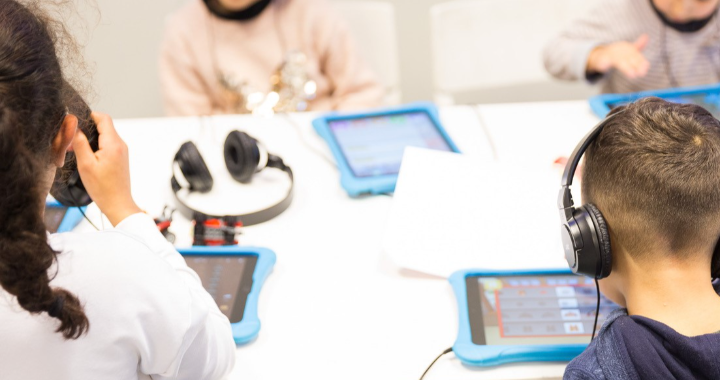Digitalisation is everywhere in our society. Whether it’s making a doctor’s appointment, requesting temporary unemployment benefits, registering your children in school, taking lessons online or requesting a certificate from the municipality: it is increasingly common that these things can only be done digitally. Unfortunately, not everyone has the possibility or the skills to use these digital tools. The digital divide affects some groups more than others.
Digital Inclusion Ecosystem
In November 2020, BNP Paribas Fortis, launched the Digital Inclusion Ecosystem with the operational support of Co.Station. This initiative brings together players from various sectors and backgrounds to build synergies and cooperate with one another. The project aims to contribute to bridging the digital divide by putting digital inclusion on the agenda, by developing a network and by creating a number of ready-to-use solutions that have a positive impact in both the short and the long term.
The ecosystem unites parties that can, by working together, really make a difference. The stakeholders in the Ecosystem are:
- For the business world: AG Insurance; BNP Paribas Fortis; Colruyt Group; Deloitte; DNS Belgium; De Watergroep; IBM; itsme®; Microsoft; Proximus; VRT
- For social organisations: Beego; Close the Gap; DigitalForYouth.be; Hobo; Maks; Mediawijs
- For the federal and regional governments and administrations: Actiris; Agence du Numérique; Opgroeien agency; Brussels Regional Informatics Centre (BRIC); Federal Public Service Policy & Support (BOSA); Federal Public Service Finance: Walloon Public Service – Economy, Employment, Research.
Michael Anseeuw, General Manager Retail Banking at BNP Paribas Fortis: “Digital inclusion is a social challenge that we all must tackle together. In addition to designing solutions to bring everyone on board of the digital train and keep them there, we want to make companies, authorities and other organisations aware of their role here. The ecosystem that we have set up inspires and encourages cooperation in order to leave no one behind in the digital processes that are omnipresent in the world of business and public institutions.”
Béatrice de Mahieu, CEO of Co.Station: “Accelerated by the pandemic, digitalisation brings tremendous opportunities to Belgian citizens. But it's crucial that companies maintain a strong commitment to bringing ALL citizens on board, to make sure we do not widen the social gap. So it's not only about digitising services. It's also about engaging, educating and assisting all citizens to understand the potential of digital for each of us. This concerns both private and public companies, as well as public services. No one should be left behind in this digital journey. This is the societal commitment we want to make. We want to build a “coalition of the willing” that want to join this mission.”
The participants are being supported by various experts. They too, belong to organisations with diverse backgrounds:
- For the academic world: UCLL; UCLouvain; VUB
- For the business world: 3 Step IT; Anysurfer; BNP Paribas Leasing Solutions
- For social organisations: Centrum Kauwenberg; Digidak; Eleven Ways; King Baudouin Foundation; Link in de Kabel; Lire et Ecrire; Vlaamse Ouderenraad; Wablieft; We Tech Care
- For federal and regional governments: District09; EPN De Wallonie.
Périne Brotcorne, researcher and assistant at the Université Catholique de Louvain: “Vulnerability in the face of the digitalisation of society does not only concern those groups traditionally considered to be ‘at risk of digital exclusion’, such as poor households or those with a lower level of education,. It also affects many other people who are professionally and socially well integrated into society.”
Ilse Mariën, post-doctoral researcher e-Inclusie imec-SMIT Vrije Universiteit Brussel: “The coronavirus crisis is making it more obvious than ever that we need to commit to digital inclusion on a society-wide scale. BNP Paribas Fortis’ initiative responds to this issue by bringing together private partners, local authorities, policy makers and, most importantly, social players who have already been working to promote digital inclusion for years, to undertake joint projects.”
Digital illiteracy
The groups most impacted by the digital divide are people living in poverty, those with low literacy levels, parents, young people and people with disabilities.
No fewer than one family in ten in Belgium does not have an internet connection at home. Among low-income households, this figure rises to three in ten. The lack of access to digital tools is one of the main causes of the digital divide.
A second cause is the lack of digital skills. Thirty per cent of Belgians have inadequate digital skills.
A third cause is digital stress. People who are capable of using digital tools sometimes choose not to do so for various reasons. Technology is evolving at such a rapid pace that some people are unable to keep up. Moreover, there are concerns about privacy and security online, or apps and websites are not sufficiently user-friendly.
Six solutions to bridge the digital divide
The Digital Inclusion Ecosystem proposes six concrete solutions to counter digital exclusion. In the next phase, these solutions will be further developed, tested and implemented. In the run-up to this second phase, other organisations have the possibility of joining the ecosystem. Read more info on the six solutions in the attachment.
Awareness campaign
The first solution aims to place digital exclusion clearly on the agenda. The real extent of the problem and the groups affected by the digital divide are not yet sufficiently acknowledged among the general public. An awareness campaign is to be organised for companies, authorities and individuals.
Reinforcing existing initiatives
As there is already a variety of valuable digital inclusion initiatives, it is crucial to support and strengthen these projects. A platform will be created for this purpose.
A mobile solution for target groups that are difficult to reach
Some of the 40% of Belgians who are at risk of digital exclusion are currently not being reached by organisations that could offer them the necessary support. As a result, they do not actively take part in our digital society. To reach this group best, the offer available has to go to them. The mobile solution that the ecosystem is proposing, makes it easier to get hard-to-reach groups, to take the first steps towards digital autonomy.
A local access point for everyone
Local contact points where people can go to use a computer or ask questions are often insufficiently known among the public. Therefore, the ecosystem proposes to appoint a local official responsible for digital inclusion and to create a local access point.
Digital inclusion index
The Digital Inclusion Ecosystem aims to help public and private organisations to become more digitally inclusive. Therefore, it plans to develop an index, or a global standard, which enables these organisations to assess how digitally inclusive they are. This index will also encourage them to adapt and reorient their processes and tools better to those who are digitally vulnerable.
Updating digital skills simply and using automated means
People sometimes do not take the first step towards digitalisation because they are prevented by stigmatisation and shame on the one hand, and the lack of solutions on the other. The range of solutions currently available is inadequate or expensive. This is why the ecosystem proposes a solution that is automated and easy to use.
Note: The figures in this press release are based on the ‘Digital Inclusion Barometer 2020’ from the King Baudouin Foundation, which can be consulted via this link: https://e-inclusie.be/onderzoeken/2020-barometer-digitale-inclusie.
Press contacts: see attachment.
BNP Paribas Fortis (www.bnpparibasfortis.com) offers a total package of financial services in Belgium for private individuals, self-employed workers, professionals, companies and public institutions. In the insurance sector, BNP Paribas Fortis works closely, as a tied agent, with Belgian market leader AG Insurance. At international level, the Bank also provides high-net-worth individuals, large corporations and public and financial institutions with customised solutions, for which it is able to draw on the know-how and international network of the BNP Paribas Group.

